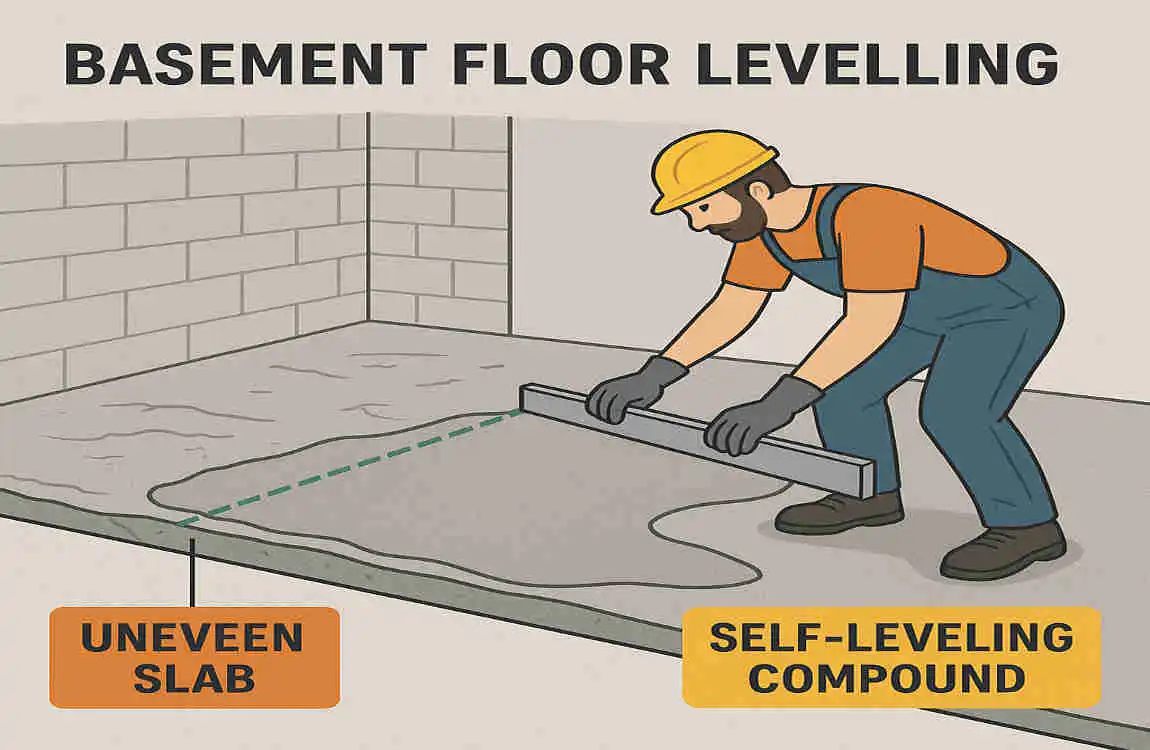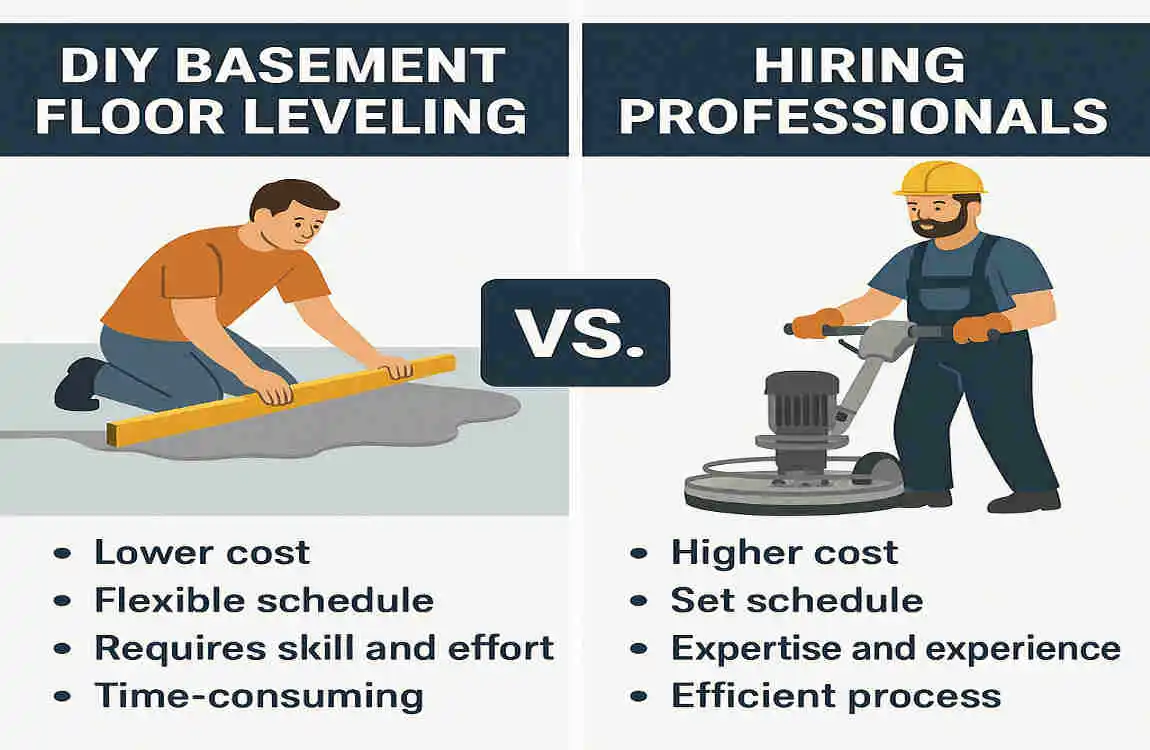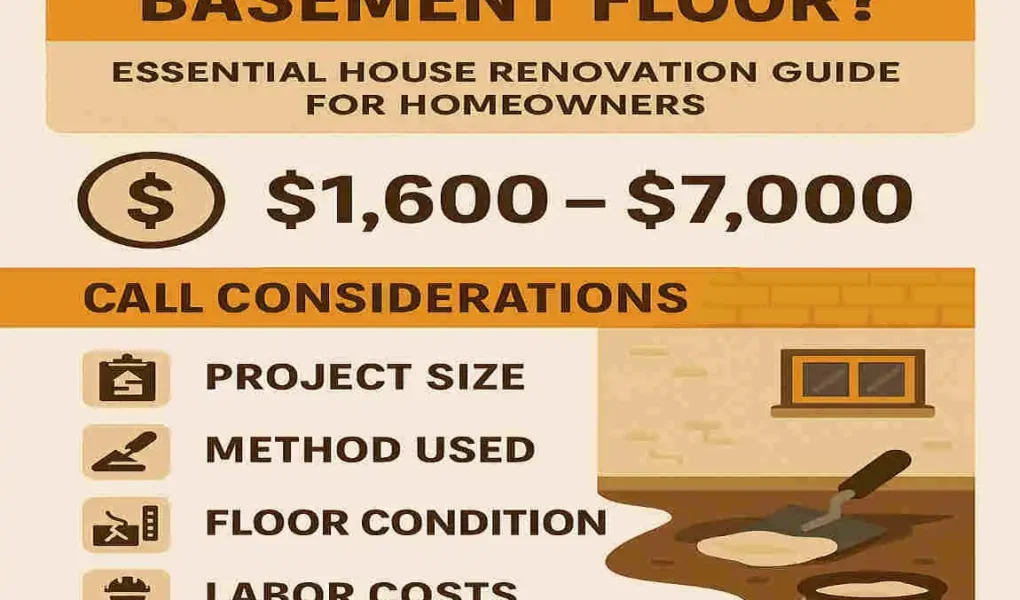Hey there, homeowner! Are you thinking about leveling your basement floor? It’s a smart move that can really boost your home’s value and livability. But you’re probably wondering, “How much does it cost to level a basement floor?” Well, you’ve come to the right place! In this comprehensive guide, we’ll dive into everything you need to know about basement floor leveling costs and the entire process.
Understanding Basement Floor Leveling

What is Basement Floor Leveling?
Basement floor leveling is the process of making your basement floor even and smooth. Over time, basements can become uneven due to various factors, and leveling helps to correct these issues. A level floor not only looks better but also provides a solid foundation for any future flooring you might want to install.
Common Reasons Basements Become Uneven
There are several reasons why your basement floor might be uneven. Here are some of the most common culprits:
- Settling: Over time, the soil beneath your home can shift and settle, causing the foundation to move and the floor to become uneven.
- Moisture: Water damage or high humidity can lead to cracks and unevenness in your basement floor.
- Poor Original Construction: If your home’s foundation wasn’t built correctly, it can result in an uneven basement floor from the start.
Signs Your Basement Floor Needs Leveling
How do you know if your basement floor needs leveling? Keep an eye out for these telltale signs:
- Cracks: Visible cracks in the floor are a clear indication that leveling may be necessary.
- Sloping: If you notice that your floor slopes in certain areas, it’s a sign that the floor is uneven.
- Unstable Furniture: If your furniture or appliances seem wobbly or unstable, it could be due to an uneven floor.
Factors Affecting the Cost to Level a Basement Floor
When it comes to the cost of leveling your basement floor, several factors come into play. Let’s take a closer look at each of these factors:
Size of the Basement and Floor Area to be Leveled
The larger your basement and the more floor area that needs to be leveled, the higher the cost will be. It’s essential to measure your basement accurately to get a clear idea of the project’s scope.
Extent of the Unevenness or Damage
The severity of the unevenness or damage in your basement floor will also impact the cost. Minor issues can be fixed more easily and at a lower price than severe problems that require extensive repairs.
Type of Leveling Method Required
There are several methods for leveling a basement floor, and the cost can vary depending on which method best suits your situation. We’ll dive into the different methods and their costs in the next section.
Basement Accessibility and Prep Work Needed
If your basement is difficult to access or requires extensive prep work before leveling can begin, it may increase the overall project cost. Make sure to factor in any necessary prep work when budgeting for your basement floor leveling.
Geographic Location and Local Labor/Material Costs
The cost of labor and materials can vary depending on where you live. In some areas, the cost of living is higher, which can translate to higher costs for basement floor leveling. Be sure to research local prices to get an accurate estimate.
Additional Waterproofing or Structural Repair
If your basement has moisture issues or underlying structural damage, you may need to address these problems before or during the leveling process. This additional work can increase the project’s overall cost.
Common Basement Floor Leveling Methods and Their Typical Costs
Now, let’s explore the different methods for leveling a basement floor and their typical costs. Each method has its own pros and cons, so it’s essential to choose the one that best fits your needs and budget.
Self-Leveling Compound
Pros:
- Best for minor unevenness
- Quick and affordable
Cons:
- Not suitable for severe unevenness
- May require multiple applications
Typical Cost: $2-$5 per square foot
Self-leveling compound is a liquid that’s poured onto the floor and spreads out evenly on its own. It’s an excellent option for minor unevenness and can be done relatively quickly and affordably.
Mud jacking (Slab jacking)
Pros:
- Lifts and fills voids under concrete slabs
- Can be less expensive than a full replacement
Cons:
- Not suitable for all types of unevenness
- It may not be as durable as other methods
Typical Cost: $3-$6 per square foot
Mudjacking, also known as slabjacking, involves drilling holes in the concrete and injecting a mixture of water, soil, and cement underneath the slab to lift and level it. This method is effective for certain types of unevenness and can be less expensive than full replacement.
Concrete Grinding
Pros:
- For minor leveling by grinding high spots
- Can be done quickly
Cons:
- Not suitable for severe unevenness
- May create dust and debris
Typical Cost: $3-$5 per square foot
Concrete grinding involves using a machine to grind down high spots on the floor, creating a more level surface. This method is best for minor leveling and can be done relatively quickly.
Partial/Full Concrete Replacement
Pros:
- Most effective for severe issues
- Provides an entirely new, level surface
Cons:
- Most expensive option
- Can be time-consuming
Typical Cost: $6-$12 per square foot
If your basement floor is severely uneven or damaged, partial or complete concrete replacement may be necessary. This involves removing the old concrete and pouring a new, level slab. While it’s the most expensive option, it provides an entirely new, level surface.
Additional Costs Homeowners Should Consider
When budgeting for your basement floor leveling project, don’t forget to factor in these additional costs:
- Basement Moisture Control and Waterproofing: If your basement has moisture issues, you may need to invest in moisture-control and waterproofing measures, which can increase the overall cost.
- Removal and Disposal of Old Flooring or debris: If you have old flooring or debris in your basement, you’ll need to factor in the cost of removal and disposal.
- Repairs Related to Underlying Structural Damage or Foundation Issues: If your basement has underlying structural damage or foundation issues, you may need to address these problems before or during the leveling process, which can add to the cost.
- Permits and Inspections: Depending on your local regulations, you may need to obtain permits and inspections for your basement floor leveling project, which can come with additional fees.
- Cost of Hiring Professionals vs. DIY Approaches: While DIY leveling can save you money on labor costs, it may not always be the best option. Hiring professionals can ensure high-quality results but will add to the project’s overall cost.
Step-by-Step Process of Basement Floor Leveling
Now that you understand the different methods and costs, let’s walk through the step-by-step process of leveling your basement floor:
Initial Inspection and Measuring Unevenness
The first step is to have a professional inspect your basement floor and measure the extent of the unevenness. This will help determine the best leveling method for your situation.
Preparing the Basement Floor
Before leveling can begin, the basement floor needs to be adequately prepared. This may involve cleaning, drying, and repairing cracks or other damage to the floor.
Application of Chosen Leveling Method
Once the floor is prepared, the chosen leveling method can be applied. This may involve pouring self-leveling compound, drilling holes for mudjacking, grinding high spots, or removing and replacing the concrete, depending on the method you’ve chosen.
Finishing Touches
After the leveling method is applied, the floor may need a few finishing touches. This can include sanding, sealing, and allowing the floor to dry properly before proceeding with any additional work.
Curing and Readiness for New Flooring Installation
Once the leveling process is complete, the floor will need time to cure before you can install any new flooring. The curing time can vary depending on the leveling method used, so be sure to follow the manufacturer’s recommendations.
DIY Basement Floor Leveling vs. Hiring Professionals

When it comes to leveling your basement floor, you have two main options: doing it yourself or hiring professionals. Let’s take a look at the pros and cons of each approach:
Pros and Cons of DIY Leveling
Pros:
- Can save money on labor costs
- Gives you control over the project timeline
Cons:
- Risk of errors or subpar results
- May require specialized tools and knowledge
If you’re handy and have experience with home improvement projects, you may be tempted to tackle basement floor leveling yourself. While this can save you money on labor costs, it’s essential to consider the potential risks and challenges of a DIY approach.
When It’s Best to Hire a Professional
In some cases, hiring a professional is the best choice for leveling your basement floor. Here are some situations where it’s wise to bring in the experts:
- If you have severe unevenness or damage that requires specialized knowledge and equipment
- If you’re not comfortable with the leveling process or don’t have the necessary tools and experience
- If you want to ensure a high-quality, long-lasting result
How to Find Reliable Contractors and What Questions to Ask
If you decide to hire a professional, it’s essential to find a reliable contractor who can deliver quality results. Here are some tips for finding the right contractor and questions to ask:
- Ask for recommendations: Reach out to friends, family, and neighbors who have had their basement floors leveled and ask for their recommendations.
- Check online reviews: Look for contractors with positive online reviews and a solid reputation in your area.
- Get multiple quotes: Don’t settle for the first contractor you find. Get quotes from various professionals to compare prices and services.
- Ask about experience and qualifications: Make sure the contractor has experience with basement floor leveling and the necessary licenses and insurance.
- Inquire about warranties and guarantees: Ask about any warranties or guarantees the contractor offers for their work.
Average Labor Costs and Timeframes
The cost of hiring a professional to level your basement floor can vary depending on factors like the size of your basement, the extent of the unevenness, and your location. On average, you can expect to pay between $500 and $3,000 for labor, with most projects falling in the $1,000 to $2,000 range.
As for the timeframe, the project’s duration depends on the leveling method used and the size of your basement. Most projects can be completed within a few days to a week, but more extensive projects may take longer.
How to Budget for Basement Floor Leveling
Now that you have a better understanding of the costs involved, let’s talk about how to budget for your basement floor leveling project.
Estimating a Realistic Budget
To estimate a realistic budget for your project, consider the following factors:
- The size of your basement and the area that needs to be leveled
- The extent of the unevenness or damage
- The leveling method you choose
- Any additional costs, such as moisture control or structural repairs
- The cost of hiring professionals or the materials and tools needed for a DIY approach
Once you have a clear idea of these factors, you can start putting together a budget that accounts for all necessary expenses.
Tips to Save Costs Without Compromising Quality
While basement floor leveling can be a significant investment, there are ways to save costs without compromising on quality. Here are some tips to keep in mind:
- Get multiple quotes: Don’t settle for the first contractor or supplier you find. Get quotes from various professionals to compare prices and services.
- Consider a DIY approach: If you have the skills and experience, tackling the project yourself can save you money on labor costs.
- Shop around for materials: Compare prices from different suppliers to find the best deals on leveling compounds, concrete, and other materials.
- Address underlying issues: Fixing any underlying moisture or structural issues before leveling can help prevent future problems and save you money in the long run.
Financing Options or Home Improvement Loans
If the cost of leveling your basement floor is more than you can afford upfront, there are financing options and home improvement loans available to help you spread out the cost over time. Some options to consider include:
- Home equity loans or lines of credit: If you have equity in your home, you may be able to borrow against it to finance your basement floor leveling project.
- Personal loans: Many banks and credit unions offer personal loans for home improvement projects.
- Home improvement loans: Some lenders specialize in these loans, which can be used for projects such as basement floor leveling.
Be sure to research your options and compare interest rates and terms to find the best financing solution for your needs.
Impact of a Level Floor on Home Value and Usability
Leveling your basement floor can significantly impact your home’s value and usability. Let’s take a closer look at the benefits:
Improved Livable Space and Safety
A level basement floor can transform your basement into a more usable and inviting space. Whether you want to create a home gym, a playroom for the kids, or a cozy family room, a level floor provides a solid foundation for your vision.
In addition to improving the livability of your basement, a level floor also enhances safety. Uneven floors can be a tripping hazard, especially for young children and older adults. By leveling your basement floor, you can create a safer environment for everyone in your home.
Effect on Property Value and Buyer Interest
A level basement floor can also positively impact your home’s property value and buyer interest. When it comes time to sell your home, a finished and functional basement can be a significant selling point.
Buyers are often willing to pay more for a home with a usable basement, especially in areas where living space is at a Premium. By investing in a level basement floor, you can recoup your costs and even increase your home’s resale value.
Benefits for Future Flooring Installation Choices
Finally, a level basement floor opens up a world of possibilities for future flooring installation. With a smooth and even surface, you can choose from a wide range of flooring options, including hardwood, laminate, tile, and carpet.
A level floor also makes the installation process easier and more cost-effective. Without the need for extensive prep work or leveling compounds, you can save time and money on your future flooring projects.
Common Mistakes to Avoid When Leveling a Basement Floor
As you embark on your basement floor leveling journey, it’s essential to be aware of common mistakes that can waste time and money. Here are some pitfalls to avoid:
Skimping on Preparation and Inspection
One of the biggest mistakes homeowners make is skimping on preparation and inspection. Failing to properly assess the condition of your basement floor and prepare it for leveling can lead to subpar results and future problems.
Take the time to have a professional inspect your basement floor and measure the extent of the unevenness. Follow their recommendations for preparation, including cleaning, drying, and repairing any cracks or damage.
Ignoring Moisture Issues or Structural Damage
Another common mistake is ignoring underlying moisture issues or structural damage. If your basement has moisture problems or foundation cracks, addressing them before leveling is crucial.
Ignoring moisture issues can lead to further damage and unevenness down the line. Similarly, failing to address structural damage can compromise the integrity of your basement floor and lead to safety hazards.
Choosing the Wrong Leveling Method
Choosing the wrong leveling method for your situation can also be a costly mistake. Each leveling method has its own pros and cons, and what works for one basement may not be the best choice for another.
Take the time to research the different leveling methods and consult with a professional to determine the best approach for your basement. Don’t settle for a quick fix that may not provide long-lasting results.
DIY Mistakes That Lead to Wasted Money and Time
Finally, if you’re considering a DIY approach to basement floor leveling, be aware of the potential for mistakes that can lead to wasted money and time. Without the proper tools, knowledge, and experience, it’s easy to make errors that can compromise the quality of your work.
If you’re not confident in your ability to level your basement floor yourself, it’s best to hire a professional. While it may cost more upfront, it can save you from costly mistakes and ensure a high-quality, long-lasting result.




